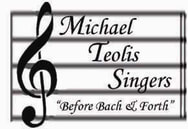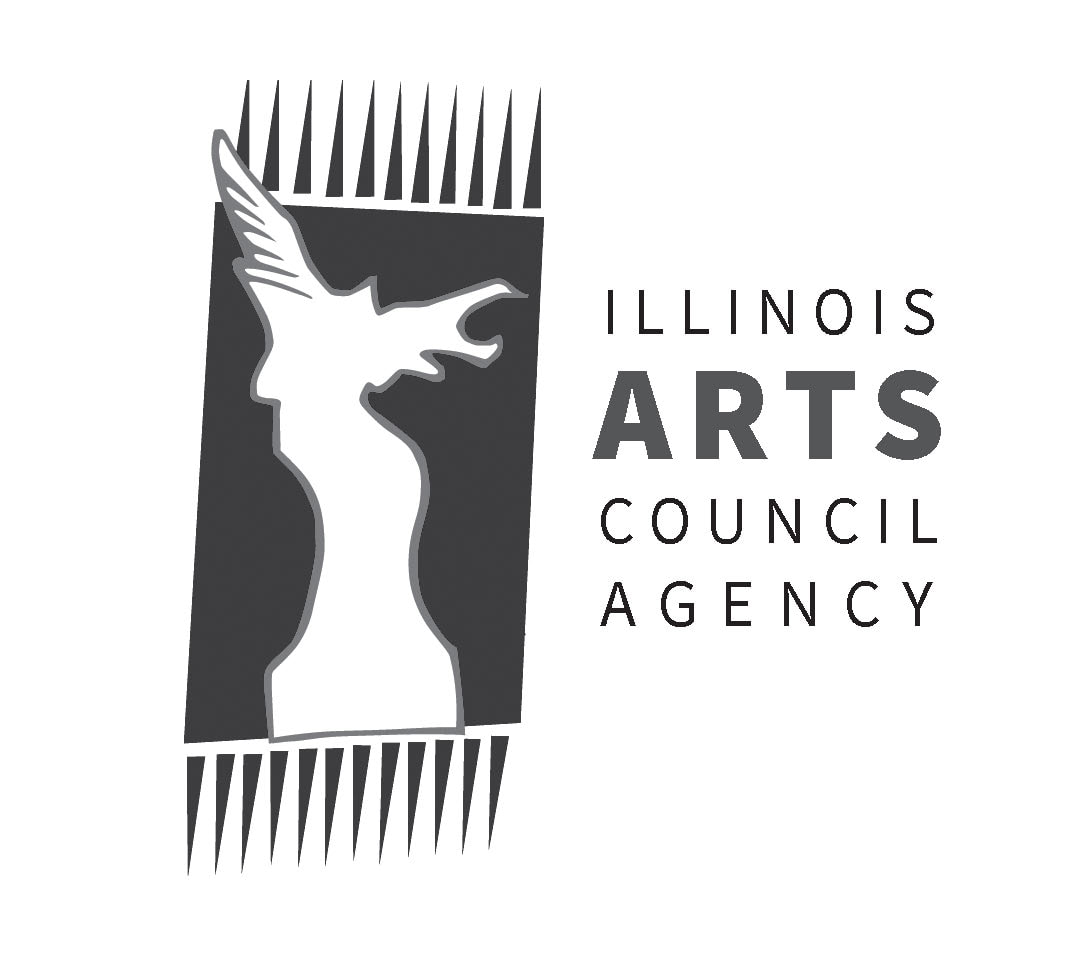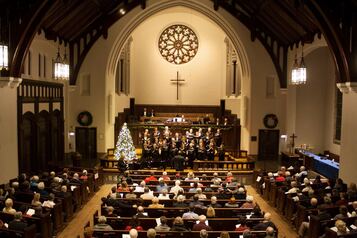 When planning these concerts, our main goal is to entertain. Those attending holiday performances want and often expect to hear some familiar music. This is why I have no qualms about programming some “old chestnuts” for our Christmas concert. It’s even part of our mission: presenting once popular music, now heard less frequently. This year’s holiday concert will be filled with some MTS favorites and familiar Christmas sounds: "Carol of the Bells,” the Parker/Shaw “Fum, Fum, Fum,” and “”Ding Dong! Merrily on High.” Our audience might recognize “Adoration of the Magi,” as Miklos Rozsa’s nativity scene theme from the film, Ben Hur. Included are two of my arrangements: the spiritual, “Go Tell It on the Mountain”, sung by the men, and another of a popular Christmas song from the Philippines, “Pasko Na Sinta Ko”, sung in the original Tagalog (a world premier!). In addition, we will present a gorgeous “Ave Maria” by Spanish composer, Javier Busto, whose setting of the text has become very popular in recent years. We always like to include some 20th Century selections, which will include “I’ll Be Home for Christmas,” (the most requested Christmas song of World War II USO shows), and Kay Thompson’s “Jingle Bells.” More about these two pieces later! This year our centerpiece is Roger C. Hannahs’ “Cantata for the Nativity, written around 1958 and scored for treble choir, four-part chorus, and organ - quite wonderful and fun to prepare. Joining us is treble choir, Perfect Cadence, from the Merit School of Music. Led by Carling Fitzsimmons, Perfect Cadence will also present three selections of their own. I’ve always felt that Christmas is a sentimental time, but joyful and happy, as well, reflected in our “up” and energetic selections. If you want a fun, uplifting performance to start your Holiday Season, join us for this concert! 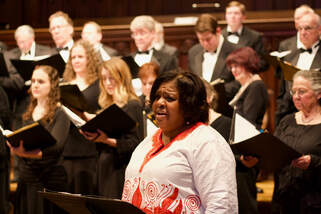 Our season began with the “Serenade of Carols,” which featured several selections with harp. The centerpiece was Stephen Paulus’ Three Nativity Carols. Other numbers performed with harp included William Ferris’ arrangement of A la Nanita Nana and the traditional French carol Sing We Now of Christmas, arranged by Fred Bennett and Carol Barnett. Morton Gould’s Serenade of Carols closed the program. MTS finished its 12th season with a flourish of music of 15 composers noted for their film scores. In addition to selections from some of Hollywood’s most memorable movies, the audience was introduced to the “other side” of some of film music’s most important names. As always, MTS featured several premieres, as well as performances by guest artists. These premieres included Le Chœur des Cœurs, by French composer Germaine Tailleferre; Lullaby by Miklos Rozsa from the film Jungle Book; and Bruce Broughton’s Bellevue Carol, from the film Miracle on 34th Street. Soprano, Alfreda Burke, joined the ensemble to reprise her performance of Alex North’s Negro Mother, and closed the evening’s concert with her spirited take of Jester Hairston’s Amen, from the film Lillies of the Field. And last, but not least, MTS once again was invited to participate in the 17th annual Thomas A. Dorsey Commemoration at Pilgrim Baptist Church. Pilgrim was the birthplace of gospel music, as we know it today. Dorsey, who was music director at Pilgrim Baptist Church for more than forty years, authored the hymn, Precious Lord, Take My Hand (the favorite hymn of Dr. Martin Luther King). He is considered the “father of Gospel Music.” MTS will reprise some of the music from their recent spring concert. Alfreda Burke will also join MTS for this event, which is free and open to the public. Watch for our plans for our exciting 13th season! 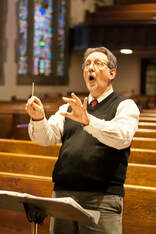 I have always been fascinated by the music used in film and the people who created it. I think the scores that made the greatest impression on me at the start were the Errol Flynn swashbucklers, with music by Erich Wolfgang Korngold – Captain Blood, The Adventures of Robin Hood, and The Sea Hawk. I’ve always loved the main them Korngold created for The Prince and the Pauper, which he eventually rolled into his Violin Concerto in D. In the same piece, he quoted themes from 3 other films he scored: Another Dawn, Juarez, and Anthony Adverse. I always wondered what kind of works they would create away from the confinements of a film. I was curious of their versatility. I believe it has only been recently that these composers are being recognized and given more credit for their artistic abilities and creativity. I found in nearly every case, that these composers were well-trained, often very sophisticated musicians. For me, Korngold’s work inspired me to look into the work of other film composers. I learned about Miklos Rozsa, Alex North, Franz Waxman, and Bernard Hermann. I learned about the contributions to film music of some of the biggest names in music for the concert hall: Leonard Bernstein, Aaron Copland, Georges Auric, Malcolm Arnold, William Walton, and John Corligiano. Even Benjamin Britten, Dimitri Shostakovich, and Serge Prokofiev wrote scores for film. Miklos Rozsa taught classes in film composition. Ironically, John Williams was one of his students. When considering themes for these choral concerts, at first, I wasn’t sure there would be enough choral music written by the film composers. Of course, there were the choral pieces written originally for the films, such as Rozsa’s work in King of Kings and Ben Hur. Presenting the choral works from film is not where I wanted to go exactly. I wanted to explore, not only their choral work in film, but also their independent concert choral works. The research has been challenging, fascinating, and exciting Fun! Entertaining! Musical! Intelligent! These are words that came back to me from those who experienced our concerts and other performances over the last year. Once again, our concerts were filled with familiar selections and area premiers.
Last summer, we were invited to perform at Pilgrim Baptist Church, to help celebrate the life and work of Thomas A. Dorsey. Dorsey, former music director of Pilgrim, is considered the “Father of Gospel Music.” He is probably best known as the author of the hymn “Precious Lord, Take My Hand.” This was our second invitation, which came from the Church’s current music director, Arnold Sevier. What a pleasure and honor it was to have been able to be part of the celebration. In December, for our central work and also a Chicago premier, we featured the “Cantata for Christmas,” for chorus and chamber orchestra, by British composer, John Gardner (1917-2011), along with many other songs of the season. We introduced our audience to composer, Rosephyne Powell and her energetic “Ogo Ni Fun Oluwa!” as well as to Mack Wilberg’s arrangement of “Christmas is Coming,” for chorus and piano-four-hands. Rounding out the program, were carol arrangements and John Williams’ crowd-pleaser, “Three Songs from Home Alone.” Sing, Illinois! was our theme for the spring, as we featured the choral works of composers born in Illinois or who spent parts of their lives cultivating their crafts in Illinois. Those composers included, among others, William Ferris, Leo Sowerby, Norman Luboff, Ned Rorem, and Ron Nelson. Women composers prominently featured included Margaret Bonds, Florence Price, Shirley Whitecotton, and Oak Park resident and Unity Temple Music Director, the late Lora Aborn. The central work was John La Montaine’s “Nonsense Songs from Mother Goose.” La Montaine, a Pulitzer Prize-winner, also grew up in Oak Park. Joining us specially for the concert was guest trumpet virtuoso, Joseph Burgstaller. Burgstaller (formerly of the Canadian Brass and a Yamaha Artist) performed with the ensemble on several selections, including his own arrangement of Astor Piazzola’s song, “Oblivion,” for flugel horn and a cappella chorus. He dazzled the audience with his performances of music by Reicha and Rafael Mendez’s arrangement of “La Virgen de la Macarena.” Organist, Corrado Cavalli deftly supported the ensemble on several selections, with his exceptional musicianship and insight. We look forward to Season 12 and beyond, hoping to continue to introduce wonderful literature, but always keeping in mind that we must touch our audiences – oh, and have fun! 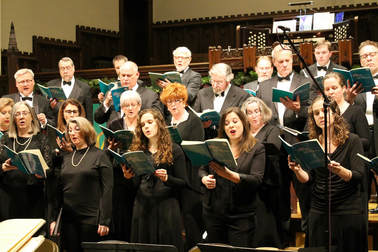 This year’s spring concert will be a musical celebration of Illinois’ Bicentennial. We will feature the choral music of sixteen composers who were born in Illinois or had an impact on the State’s musical life. We are including some unique discoveries, such as “Union and Liberty” by Frederick Stock, to a text by Oliver Wendell Holmes. Frederick Stock was the music director of the Chicago Symphony Orchestra 1905-1942. We will present “To Music,” by Oak Park composer, and music director at the famed Unity Temple, Lora Aborn, and “Aftermath,” a piece for treble chorus by Aurora native, Shirley Whitecotton. Joining us for this concert will be special guests trumpet artist, Joe Burgstaller, and organist, Corrado Cavalli. Joe Burgstaller, formerly a member of the Canadian Brass, will perform the flugel horn solo with the chorus on his arrangement of Astor Piazzola’s song, “Oblivion,” as well as a muted trumpet feature on William Russo’s “I Lift Up My Eyes.” Organist, Corrado Cavalli, will accompany the ensemble on several selections, including William Ferris’ “Festival Alleluias,” Eric De Lamarter’s “God is Our Refuge,” and “O Give Thanks Unto the Lord,” by Leo Sowerby. The central work for this concert is Oak Park native, John La Montaine’s rollicking “Nonsense Songs from Mother Goose.” This is our contribution to the State’s bicentennial celebration. The Michael Teolis Singers begins its next decade with a holiday concert that includes
some new Christmas sounds, new takes on old Holiday favorites, and reprises from the MTS Holiday files. Our season opens with “Christmas is Coming!” As with our previous concerts that have always presented lively songs of the season, this one display the ensemble’s versatility and a variety of musical genres and styles. Featured on our Christmas program will be the music of William Mathias, Allan Bullard, Noel Goemanne, William Ferris’ haunting Christmas carol, “Gentle Mary.” The concert title piece is Mack Wilbeg’s rollicking arrangement of the carol, “Christmas is Coming,” arranged for chorus and piano four-hands. As always, the ensemble likes to bring to light the music of established contemporary composers. For this concert, and as our central work, we will present the Chicago premier of “Cantata for Christmas,” by British composer, John Gardner. Some familiar songs of the season will include, “Welcome Christmas,” from the film,” The Grinch Who Stole Christmas”; “The Pretty Little Dolly,” which was first performed by Mona Aboud on the Tonight Show in 1962; and we will close with the medley from the film “Home Alone.” In anticipation of its 200th anniversary, we will also perform the traditional carol, “Silent Night,” as arranged by William Ferris. There were ten seasons of exploring and research, resulting in unique, enterprising, and amazing music, along with perceptive, energetic, musical, and convincing performances! 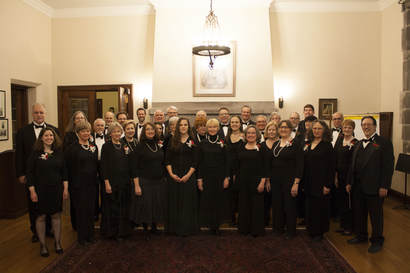 We introduced new music and looked at the “other sides” of some established composers. Who would have thought that songwriters such as Harry Warren and Meredith Willson would have written Catholic Masses; or that “The March King,” John Phillip Sousa, would have written a “Te Deum”; or that Charles Strouse (Annie, Bye Bye Birdie) would have studied with the great pedagogue, Nadia Boulanger, and would have written a psalm setting for a cappella chorus? When was the last time a vocal ensemble programmed the two cantatas written by the orchestrator of the works of Kern, Gershwin, and Rodgers – Robert Russell Bennett? When and where was there ever a concert dedicated to 17 woman composers? To black composers, from Colonial times to the present? None of this would have been possible without the dedication and commitment to the organization’s vision by the founding members, the MTS Board and, especially, the singers – past and present. The Michael Teolis Singers reached the point a while ago that the organization needs to go beyond being one of the area’s best kept secret. In the coming seasons, we hope to continue to explore – in order to present – unique material and bring to the audience music that is accessible and should be in the mainstream repertoire. After ten years, we will be doing some reprises of selections we already introduced, in addition to some more “hidden gems.” Our themes will continue to be innovative. We will continue to educate, but always keeping in mind our main job is to entertain.
We have come a long way, but there’s still so much to look forward to. We began the celebratory season with a “Brassy Christmas,” presenting some traditional favorites dressed up with brass, percussion, and organ: Ovid Young’s “A Christmas Intrada”; the David Willcocks arrangement of “O Come All Ye Faithful”; Ferris’s “The Lord Said to Me”; and the Teolis arrangements of “The Sussex Carol (On Christmas Night)”; “Joy to the World”; and “We Wish You a Merry Christmas.” The Daniel Pinkham “Christmas Cantata” added a wonderful centerpiece to the Holiday musical festivities. As with all of our concerts, we like to add the “hidden gems.” For this concert, they included Teolis arrangements of “A Christmas Carol” by Charles Ives, and the world premiere of an “Ave Maria” constructed from sketches by 3-time Academy Award winner, Harry Warren. Adding to the fun, was the jazzy arrangement by Ray Charles (the choral director/composer/arranger for the Perry Como Show, not the R&B artist) of “Jingle Bells.” To cap off the regular season, we presented “An Evening of Irreverence.” As the title suggests, the programming for this concert was never intended to be anything less than fun and, at times, madcap. The King’s Singers version of the “Barber of Seville” set the tone for the rest of the concert. Among the selections were Jonathan Willcocks’ “Drunken Sailor”; Randy Newman’s “Short People”; and Robert Russell Bennett’s “Crazy Cantata #1 Three Blind Mice,” which we reprised from an earlier season. The men of the ensemble presented the Teolis arrangement of Steve Goodman’s “The Lincoln Park Pirates” and PDQ Bach’s “Art of the Ground Round,” while the women brought down the house with their renditions of Frank Bridge’s “Peter Piper” and “The Cat Duet.” As always, we try to include premiers and special presentations. For this concert, there were arrangements that were presented for the first time, including the Midwest premier of H. Leslie Adams’ “There Was an Old Man” and an arrangement of Allan Sherman’s “Hello Mudduh, Hello Faddah,” as arranged by yours truly. Fun fact: we were able to procure permission from Robert Sherman, the son of Allan Sherman. I was only able to track down the copyright owner after going to the ASCAP site and typing in “Hello Mother, Hello Father,” after several tries of typing in “Hello Mudduh, Hello Faddah.” Allan Sherman, by the way, was a Chicago boy, born on the near north side of the City. The full ensemble presented arrangements of Tom Lehrer’s “Poisoning Pigeons in the Park” and “Pollution,” among many others, including a rollicking version of “Zombie Jamboree,” which closed the program.
There was sort of a coda to the season, as MTS was specially invited to perform at the annual Thomas A. Dorsey Commemoration, which was held at Pilgrim Baptist Church, 3300 S. Indiana, on Chicago’s south side. Pilgrim Baptist Church is the birth place of Gospel Music. This style of music was introduced and developed by Thomas A. Dorsey, author of the well-known hymn “Precious Lord, Take My Hand, which, by the way, was the favorite hymn of Dr. Martin Luther King, Jr. It was also performed at King’s funeral. This was the second time in the past three years MTS was invited to the Dorsey Celebration. What will the next ten years hold for us? Please check our website for our plans for the coming season and for any special events or announcements. “Irreverence” is a theme I’ve had in mind almost since the inception of the ensemble. A founding member and friend, Mark Peterson, suggested the concept to me after our first concert. With this being the 10th anniversary, I thought the timing was right to “loosen our ties” a bit and explore some silliness in music.
Nothing on this program is serious – this is intentional. There is so much artistic material out there that is intelligent, well constructed, and fun. At the same time, there is literature that is all of that and just plain silly. Comedic pieces can be just as challenging to prepare and perform as serious, legitimate works, and just as entertaining for the audience. There will not be a lot of visual gags at this concert, but there will be some. The idea is to have the music pretty much speak for itself. One can’t plan a program like this without including certain pieces or certain composers. Composers/song writers Allan Sherman (Chicago-born), Tom Lehrer, and PDQ Bach will be featured. Along with their music, there will be reprises of pieces we’ve performed over the last 9 seasons. Among them are Robert Russell Bennett’s “Crazy Cantata – Three Blind Mice,” and my arrangements of “Lincoln Park Pirates,” “The Typewriter,” and “If You’ve Only Got a Moustache.” Rounding off the program will be some other unique, witty, and sometimes zany selections – some written by legitimate composers. If you’re looking to get away from all of the insanity in the world, come to this concert for some madcap musical entertainment. I’m sure this performance will put a smile on your face, no matter what your age. You might even walk away humming a few of the tunes! It’s hard to believe that it all started with a few friends chatting “what if…?”, then sitting down in a living room for more chatting; making some phone calls, and then an assembled ensemble. Many of us had sung together for many years. Others were coming with experience with other ensembles in the area, including the Chicago Symphony and with ensembles as afar away as the Dallas Symphony Chorus. Our membership has evolved. We have lost some dear friends and added new ones. I’m proud to say that a third of our membership is made up of the original 24 Singers from that first season: Louise Brueggemann, Nancy Greco, Peg McMahon, Susan Wolz, Sidni Kiely, Julie Zeller, Ben Beach, Kim Lyons, Carl Janus, Erik Johnson, Mark Peterson, Walter Shalda, and Rebecca Lake, who joined us later in the first season. Thank you so much for your continued dedication and friendship.
Over the years, the ensemble has introduced and re-introduced to the public literature that was or should be part of the standard repertoire. Our programming is unique and enterprising. Our concerts are entertaining, enlightening, and historic. In the past nine seasons, MTS has presented many world, Mid-West, and Chicago premiers. We have shown sides of composers that no one knew existed: Catholic mass settings written by award-winning songwriters Harry Warren (“Chattanooga Choo-Choo,” “I Only Have Eyes for You,” “At Last”) and Meredith Willson (Music Man); a psalm setting written by Charles Strouse (Annie, Bye Bye Birdie), and a “Te Deum” written by a young John Philip Sousa, the “March King.” We reintroduced Margaret Bonds’ amazing “The Ballad of the Brown King” and film composer Alex North’s cantata, Negro Mother, which hadn’t been heard since 1947. We have presented concerts of Broadway composers, of Chicago composers, of all-black composers, and of all-women composers. We will continue to present the music of these important and talented composers, and we will remain true to our mission throughout the coming season and seasons thereafter. My thanks to the singers who sing with us now, who have sung with us over the years, and to the many faithful audiences members who have joined us at each concert. We look forward to presenting more “undiscovered gems” created by gifted composers whose names are familiar and unfamiliar, and who represent many diverse backgrounds and styles. |
Michael TeolisReflections on concerts, composers and music... Archives
February 2024
|
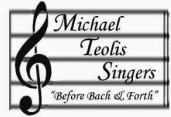
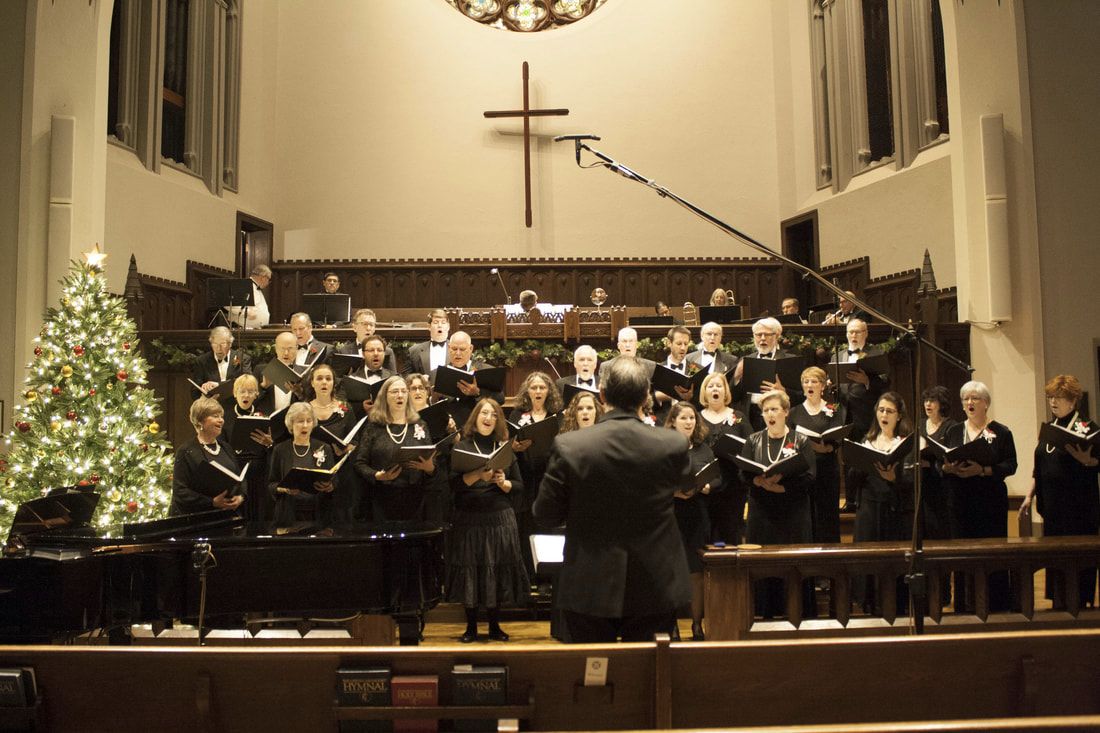
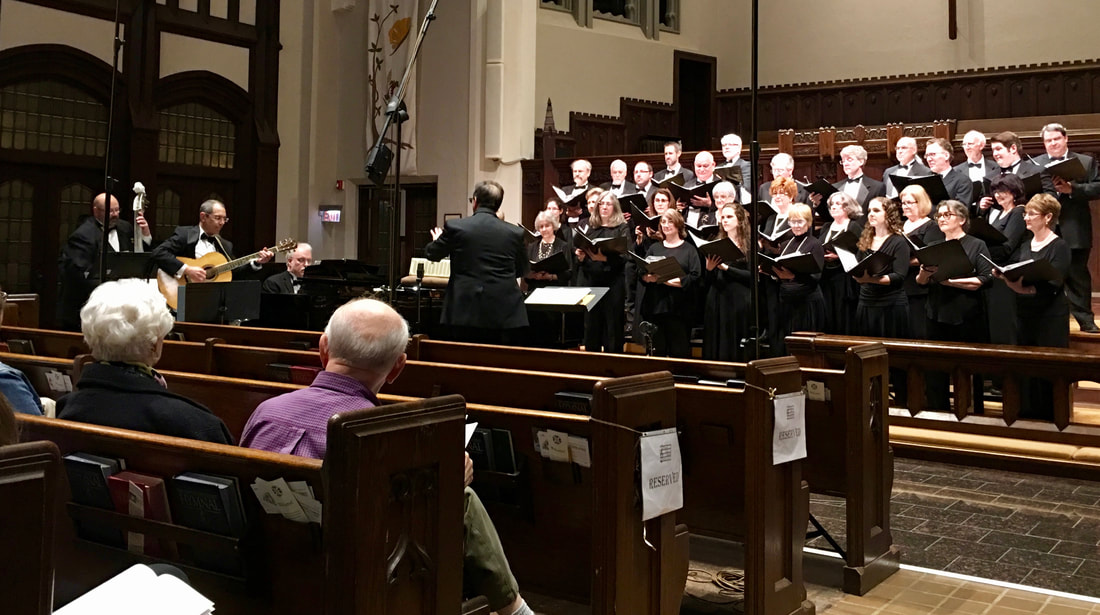
 RSS Feed
RSS Feed
